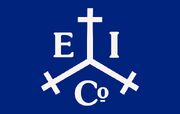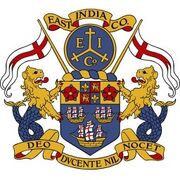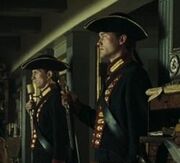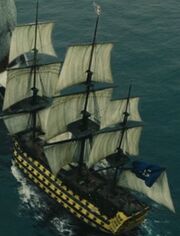The East India Trading Company, otherwise referred to as the East India Company or abbreviated as EITC, was a joint-stock company and megacorporation formed for pursuing and monopolizing trade with the East Indies and the Caribbean. The East India Company traded mainly in cotton, silk, indigo dye, salt, saltpetre, tea and opium. The Company was Created on December 31, 1600 by Templars. Shares of the Company were owned by wealthy merchants and aristocrats. The government owned no shares and had only indirect control. The Company eventually came to rule large areas of India with its own private armies, exercising military power and assuming administrative functions.

The Flag of the East India Trading Company

The EITC Coat of Arms

An East Indiaman, the main Ships of the Company

EITC Soldiers

The HMS Endevour, An Example of a East Indiaman-of-War
History[]
Founding
The English East India Trading Company was established by The Themplars who discovered the exotic riches of the East Indies, particularly India, during their initial voyages to the region. With trading voyages sponsored by English merchants hoping to profit from gold, silver, ivory, silk and spices, the company grew in size and power. It began to expand into the Caribbean when the attention of the company's leaders turned to the area's rich plantations. This expansion was led by it's Governor/Chairman Lord Cutler Beckett. The company ultimately expanded so much that any threat posed to it was a threat to Great Britain itself.
Piracy and Assassins were the biggest problems for the Company. In the late 1720s, several EITC ships was sent to join Admiral Lawrence Norrington's Royal Navy fleet and participate in his hunt for John Mayflower, Keeper of the Code and one of the most notorious pirates on the Seven Seas. Though Norrington managed to capture Mayflower for a brief time, his mission miserably failed.
The company was based in London, led by a single Governor and a Court of Directors. Through one of its employees, Cutler Beckett, it was known to have condoned the transport of slaves from Africa to the Caribbean. However, George Driner, captain of the Wicked Wench, refused to carry out this sinful task, and Beckett had his ship torched and George himself branded a pirate.
